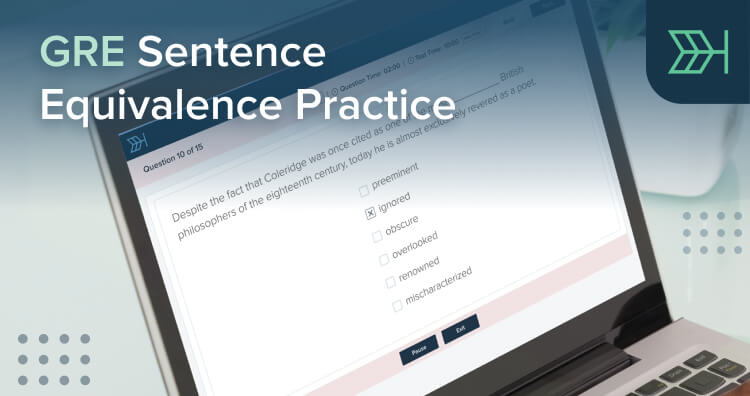
GRE Prep Club Daily Prep
Thank you for using the timer - this advanced tool can estimate your performance and suggest more practice questions. We have subscribed you to Daily Prep Questions via email.
Customized
for You
Track
Your Progress
Practice
Pays
Not interested in getting valuable practice questions and articles delivered to your email? No problem, unsubscribe here.
Target Test Prep Representative
Joined: 12 Sep 2018
Status:Founder & CEO, Target Test Prep
Affiliations: Target Test Prep
Posts: 2225
Given Kudos: 5
GRE Sentence Equivalence Practice
[#permalink]
 28 Jan 2022, 06:34
28 Jan 2022, 06:34
10
Expert Reply
GRE Sentence Equivalence Practice
Sentence Equivalence (SE) questions comprise about 20% of the GRE verbal questions you’ll face on test day. Although people preparing for the GRE often stress about these questions, there is actually little to worry about. With some hard work and savvy GRE prep, GRE Sentence Equivalence questions can become questions you consistently answer correctly and even look forward to solving.
If you’d like to practice with some high-value sample GRE Sentence Equivalence questions, we have several for you in this article. In addition, we’ll discuss some tips and tricks to help improve your skills in this GRE question type, so read on!
Before we practice sample Sentence Equivalence exercises, let’s take a minute to talk about what GRE Sentence Equivalence questions are.
What Are GRE Sentence Equivalence Questions?
Sentence Equivalence questions consist of a single sentence that contains one blank and six answer choices. These questions ask you to select two different answer choices to fill the blank. Your answers must (1) create a complete, logical sentence and (2) create two sentences that convey the same meaning. In other words, our task in Sentence Equivalence questions is to choose answers that result in sentences that have equivalent meanings.
The directions that ETS provides for these questions is as follows:
Select the two answer choices that, when used to complete the sentence, fit the meaning of the sentence as a whole and produce complete sentences that are alike in meaning.
On test day, Sentence Equivalence questions will appear as follows:
Let’s now discuss how many Sentence Equivalence questions are on the GRE.
How Many Sentence Equivalence Questions Are on the GRE?
In the Verbal sections of the GRE, about half of the total of 40 Verbal questions (remember, on the GRE you’ll see two 20-question Verbal sections) are either Text Completion (TC) or Sentence Equivalence (SE) questions. Thus, you can expect to see 8-10 Sentence Equivalence questions on the GRE.
If you’ve prepared properly, there is no reason why you can’t correctly answer most, or even all, of these questions.
Remember, each GRE verbal question on the exam is worth the same number of points. (In fact, each question on the GRE is worth the same number of points). Thus, it’s in your best interest to first answer the questions that you know you can solve, and then work on the ones that are more difficult for you. This way, you maximize the number of points you’ll score.
Let’s now discuss whether partial credit is awarded on Sentence Equivalence questions.
Is Partial Credit Given on Sentence Equivalence Questions?
Since two answers must be chosen, students often wonder whether they can earn partial credit on Sentence Equivalence questions.
Unfortunately, there is no partial credit on Sentence Equivalence questions. (In fact, there is no partial credit for any type of GRE question.) So, if you choose only one answer in an SE question, instead of the required two, or if you choose one correct and one incorrect answer, the question will be marked incorrect.
As promised, we now have a few tips for how you can improve your skills in answering Sentence Equivalence questions.
How to Improve Your Sentence Equivalence Skills
The good news is that there is a lot you can do to improve your Sentence Equivalence skills. The following three tips will help you do just that.
Let’s begin with a discussion of why you must go beyond just learning vocabulary words.
Tip #1: Sentence Equivalence Questions Test More Than Just Vocabulary
Success with Sentence Equivalence questions starts with your vocabulary knowledge. The truth is, building your vocabulary is an integral aspect of performing well on these questions; you’d be wise to use a solid GRE vocabulary list and use flashcards to help you memorize the words.
While vocabulary knowledge serves as a necessary foundation for correctly answering SE questions, such knowledge is definitely not the only ingredient in the “recipe” for finding correct answers.
What Sentence Equivalence tests, in addition to your vocabulary knowledge, is your ability to understand the structure and logic of sentences and the particular meanings that words convey in different contexts. Thus, mastering thousands of GRE-specific vocabulary words will not, in and of itself, make you a master of Sentence Equivalence questions.
To read the complete article, please view Target Test Prep's blog.

gmatclubot
GRE Sentence Equivalence Practice [#permalink]
28 Jan 2022, 06:34
Moderators:
|
|
||




